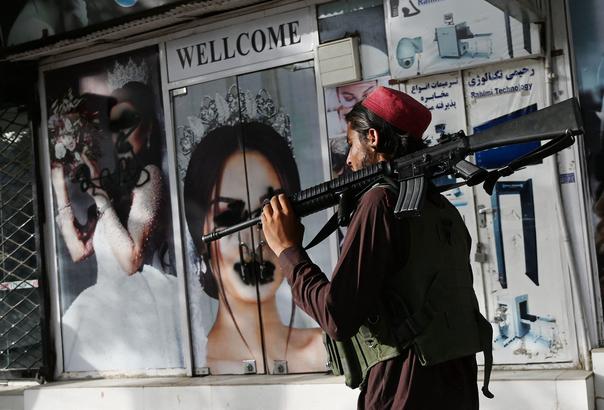
In Afghanistan, the image of women is fading ·Global Voices
Four days after their seizure of power, the Taliban continue to activate to wipe Afghan women out of public space. After images of women decorating the windows, gradually masked on the streets of Kabul in particular, journalist Shabnam Dawran reported in an online video that she had been banned from working for her station this week.
Wearing a veil and showing her corporate card, she explains that unlike her male colleagues, "I was not allowed in". "those who listen to me, if the world can hear me, please help us because our lives are in danger," alerted in this video the journalist for public television RTA, for whom she had worked for six years. "male employees with office cards were allowed to enter the office, but I was told that I could not continue to perform my duties because the system has changed," continued Shabnam Dawran. "I was told, 'you're a woman, go sit at home,' she said in an interview with India today.
The editor of the privately-owned Afghan news channel Tolo News, Miraqa Popal, was one of the first to share the journalist's video. "the Taliban did not allow my former colleague […] Shabnam Dawran started working today, "he wrote Wednesday in a tweet shared thousands of times. The day before, he had posted on the same social network a photo of a Tolo News presenter, with the following caption: "we resumed our broadcasts with presenters today."
Shabnam Dawran's testimony contradicts the Taliban's claims that the media would be independent and free. A Taliban leader had staged himself next to a woman journalist for a face-to-face interview.
On the Taliban side, words and stalks
Images of women disappear from the streets of Kabul

Not surprisingly, the international community and many Afghans were extremely sceptical about the Taliban's promises. Kabul has already changed its face. Posters and photos of women decorating the windows are masked or vandalized in the capital of Afghanistan. In the last 20 years, beauty institutes have flourished in Kabul by the hundreds, offering makeup or manicure sessions. A true novelty for some women who had grown up on a burqa, hiding their entire bodies to their eyes, under the first yoke of the Taliban between 1996 and 2001.
But here are the fundamentalists again and, as the Taliban were at the gates of the capital last week, the Kaboulis were already whitening their windows to hide advertisements on which women in wedding clothes displayed a broad smile. On Tuesday, the front floors of the beauty salons were covered with black paint to hide the faces of the models. Often, a Taliban combatant patrolled the front with an assault rifle in his shoulder.
"Let women work"
During the five years of their rule of the country, the Taliban had imposed their ultra-strict version of Islamic law. Women were forbidden to go out without a male chaperone and to work, girls to go to school. Women accused of crimes such as adultery were whipped and stoned.
Anxious to show a reassuring face and convince them that they have changed, the Taliban committed on Tuesday "to let women work", before adding "in accordance with the principles of Islam", without further clarification. A spokesman, Suhail Shaheen, said the burqa would no longer be mandatory. He also stated that women would be allowed to study at university. Schools for girls have also remained open. However, during the advance of the Taliban, the media have reported singles or widows who have been forced to marry combatants. This information was denied by a spokesman who described it as "propaganda".
Afghanistan: "Women will be trapped alive" ·Global Voices
Worldwide support
Around the world, demonstrations have been held in support of Afghan civilians, especially women and girls. On Wednesday, in a joint statement, the European Union and the United States expressed "deep concern" about the situation of women in Afghanistan, calling on the Taliban to avoid "all forms of discrimination and abuse" and to safeguard their rights.
In July, the manager of a beauty salon in Kabul told AFP that they would have to shut it down if the Taliban returned to power. "if they come back, we will never have the freedom we have now," feared the 27-year-old, asking to remain anonymous. She assured him: "they Don't want women to work."
Article mis à jour le jeudi 19 août à 19 heures avec l’éviction de la journaliste télé afghane Shabnam Dawran.







